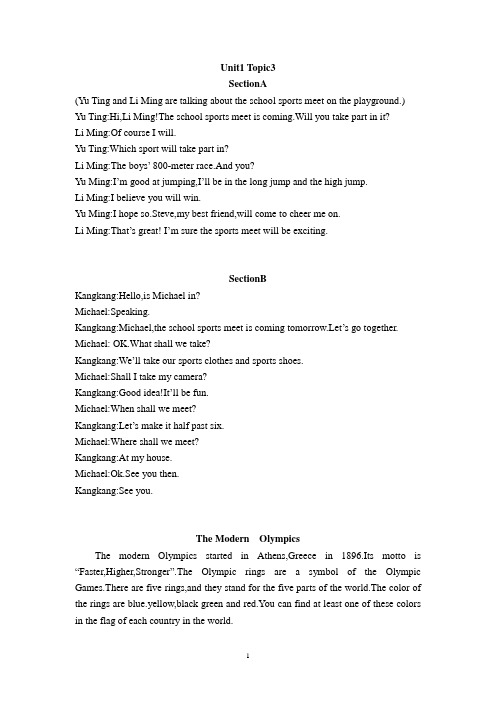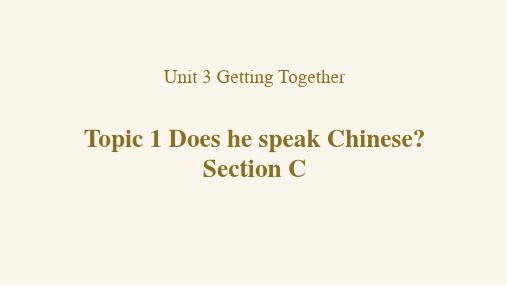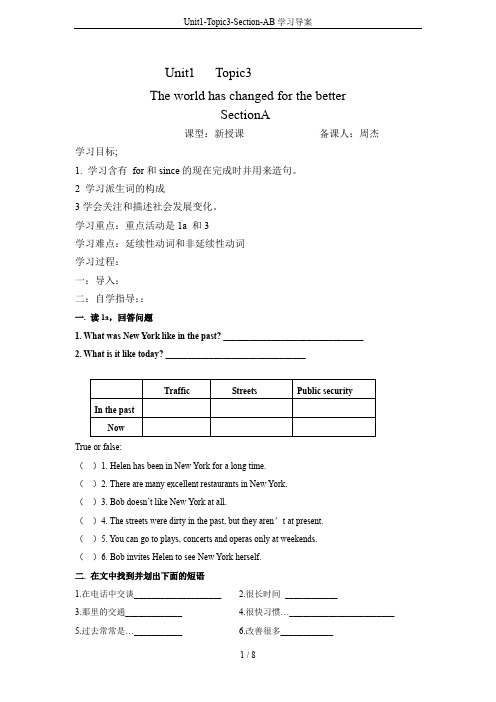Unit 1 Topic 3Section C导读单
仁爱版八年级英语 unit1 topic3 课文

Unit1 Topic3SectionA(Yu Ting and Li Ming are talking about the school sports meet on the playground.) Yu Ting:Hi,Li Ming!The school sports meet is coming.Will you take part in it?Li Ming:Of course I will.Yu Ting:Which sport will take part in?Li Ming:The boys’ 800-meter race.And you?Yu Ming:I’m good at jumping,I’ll be in the long jump and the high jump.Li Ming:I believe you will win.Yu Ming:I hope so.Steve,my best friend,will come to cheer me on.Li Ming:That’s great! I’m sure the sports meet will be exciting.SectionBKangkang:Hello,is Michael in?Michael:Speaking.Kangkang:Michael,the school sports meet is coming tomorrow.Let’s go together. Michael: OK.What shall we take?Kangkang:We’ll take our sports clothes and sports shoes.Michael:Shall I take my camera?Kangkang:Good idea!It’ll be fun.Michael:When shall we meet?Kangkang:Let’s make it half past six.Michael:Where shall we meet?Kangkang:At my house.Michael:Ok.See you then.Kangkang:See you.The Modern OlympicsThe modern Olympics started in Athens,Greece in 1896.Its motto is “Faster,Higher,Stronger”.The Olympic rings are a symbol of the Olympic Games.There are five rings,and they stand for the five parts of the world.The color of the rings are blue.yellow,black green and red.You can find at least one of these colors in the flag of each country in the world.There are Summer Olympics and Winter Olympics.They are both held every four years.The Winter Olympic Games are usually held two years before the Summer Olympic Games.Nowadays,the Olympic Games are held by different cities in turn.People from all over the world meet to compete and become friends.The Olympics are becoming more and more popular.In the future,more cities will have the chance to hold the Olympics and the Olympics Games will be more exciting.Section DSunday,Sep.21stLast week our school held a sports meet.Everyone in our class felt very excited because we won,In the boys’ relay race,Michael ran very fast and our class won first place.Yu Ting is good at the long jump and she also won.We’re sorry that we did badly in the high juup, but we’re sure we will do better next time.I took part in the boys’ 400-meter race.I did my best and was the first to cross the finish line.Now I love sports more.I want to be a soccer player.I will do more exercise every day and I hope some day I’ll be able to take part in the Olympic Games.。
Unit3Topic1SectionC课件2022-2023学年仁爱版英语七年级上册

(3)so表示因果,承接关系,意为“因此,所以”。 He comes from America, so his English is very good.
2a Listen, read and learn. A: Jan简e,,d你o y喜ou欢li中ke文C吗hin?ese? B: Ye是s,的I l,ik我e i非t v常er喜y m欢u它ch。. A: What那ab你ou呢t ?y山ou姆, S?am? B: 不No,, I我d一on点't l也ik不e i喜t a欢t a它ll.。
□Jane and Sally are very nice.
□√ We often help each other.
□Jane can speak Chinese very well.
1b Read 1a and circle True or False.
1. Jane, Sally and I are in the same class.
so还可当副词,意为“如此,这么” Its hands is so small.它的手如此小。 She is so beautif
(1)and意为“和;又;并”,表示并列关系,用来连接语法作用相同的 词、短语或句子。如: I'm from Beijing and she is from Shanghai.我来自北京,她来自上海。
他来自美国,所以他英语很好。
Language points
用and,but,so填空 1.I like English __a_n_d___ Chinese. 2.I want to buy a pair of new shoes _b__u_t_ I don’t have enough money. (足够的钱). 3.I often help my classmates ___so__ they think I’m a good student. 4.I’m a Chinese __a_n_d_ she is an American. 5.He likes English very much __b_u_t_ his English is not very good. 6.She likes English a lot __s_o___ she studies hard(努力学习) every day.
Unit1-Topic3-Section-AB学习导案

Unit1 Topic3The world has changed for the betterSectionA课型:新授课备课人:周杰学习目标;1. 学习含有for和since的现在完成时并用来造句。
2 学习派生词的构成3学会关注和描述社会发展变化。
学习重点:重点活动是1a 和3学习难点:延续性动词和非延续性动词学习过程:一:导入:二:自学指导::一. 读1a,回答问题1. What was New York like in the past? ________________________________2. What is it like today? ________________________________True or false:()1. Helen has been in New York for a long time.()2. There are many excellent restaurants in New York.()3. Bob doesn’t like New York at all.()4. The streets were dirty in the past, but they aren’t at present.()5. You can go to plays, concerts and operas only at weekends.()6. Bob invites Helen to see New York herself.二. 在文中找到并划出下面的短语1.在电话中交谈____________________2.很长时间____________3.那里的交通_____________4.很快习惯…________________________5.过去常常是…___________6.改善很多____________7.几年前___________________ 8.过去________________9.相当安全_______________ 10.事实上__________________11.来参观一下______________________ 12.亲眼目睹…____________________13.做个报告________________ 14.照顾_____________ 15.一个热心人__________三. 在文中划出下面的句子并分析1. How do you like living there?同义句:What __________________________________________________?练习:你认为长城怎么样?a._______________________b.________________________2. But I heard that the traffic there was terrible and almost everyone drove too fast.点拨:hear---听见+宾语,听说+宾语从句拓展:hear of…---听说hear from…---收到…的来信思考:2句中的heard在此意思是__________, 后面是that引导的___________________巩固:a. 我听说那里已经发生了巨大的变化。
仁爱九年级上册Unit1Topic3重要知识点,作文范文!

仁爱九年级上册Unit1Topic3重要知识点,作文范文!仁爱版英语九年级上Unit 1 Topic 3知识点梳理Section A重点短语1. 1) Helen is talking with Bob on the phone.(提问)How is Helen talking with Bob?2) I often chat with my good friend on the Internet. (提问)2. How do you like … ?= what do you think of?eg:1) How do you like the movie?= What do you think of the movie?2) How do you like living there? (同义句)= What do you think of living there?3. get used to doing sth= be used to doing sth习惯于做…eg: 1) Lily is used to going to bed early.= Lily gets used to going to bed early.2) My father is / gets to (smoke). It’s bad for his lungs.4. 含有used的句子变成一般疑问句时在句首加Did, 加了Did之后,后面的used去掉d还原成use;含有used的句子变成否定句时,在used的前面加didn’t,加了didn’t之后,后面的used去掉d 还原成use。
eg:1)I used to enjoy listening to pop music. (改为一般疑问句)Did you use to enjoy listening to pop music?2) My sister used to play the piano. (改为否定句)My sister didn’t use to p lay the piano.3) Jane used to be a teacher. (改为一般疑问句)Did Jane use to be a teacher?5. Isn’t it dangerous there? 在那儿难道它不危险吗?这是一个反问句,在英语中,反问句也可称为否定疑问句,常译为难道不…吗?结构为:be / 助动词 /情态动词的否定 + 主语 + 谓语+ …eg:1)Didn’t he go to the park yesterday?2) Can’t Lily pla y the piano?3) Hasn’t Jim been to the Great Wall?4) Won’t they go climbing next Sunday?注意:在回答反问句时,要反着译即Yes译为No, No译为Yes.1) Didn’t he go to the park yesterday?Yes, he did. / No, he didn’t.不,他去了。
Unit1+Topic+3+课文详解课件2023-2024学年仁爱版九年级英语上册

Section B
• Maria: What are you reading, Jane? be动词+V.ing (现在进行时)
• Jane: I’m reading a newspaper from Canada. Martin showed me an interesting article.
街区
事实上=in fact
wonderful place to live. Near our block, there are beautiful parks, good schools,
famous museums and excellent restaurants. And you can go to plays, concerts and
Lesson Three
Topic3 A-B
Words and passages
单词认读
背诵词汇
背诵词汇
词汇 1. with the money 2. so that 3. so...that... 4. in fact/as a matter of fact 5. come for a visit 6. in need 7. decide on sth. 8. provide sth. for sb./provide sb. with sth. 9. feel good about... 10. lend sth. to sb/lend sb. sth.
It is about a program that helps homeless people. show sb.sth.= show sth. to sb.
定语从句:从句充当形容词,修饰前面的program
给某人展示某物
九年级英语Unit1 Topic3 Section C仁爱版

Unit1 Topic3 Section CThe main activities are 1a and 2. 本课重点活动是1a和2。
Ⅰ.Teaching aims and demands教学目标1.Master some new words:skill, drug, succeed, purpose, mention, war2.Learn to help homeless people.3.Talk about social services.Ⅱ.Teaching aids教具录音机/小黑板/图片(流浪者)Ⅲ.Five-finger Teaching Plan五指教学方案Step 1 Review 第一步复习(时间:10分钟)(复习城市生活和乡村生活的差异。
)T: There are many differences between the city life and the village life. Are you sure?Ss: Yes. It’s quiet in the village. But it’s noisy in the city.There are many kinds of pollution in the city.T: But the medical care is better than that in the country.Ss: We can enjoy many programs in the city.T: You have discussed the differences between the city life and the village life.Have you known about the differences?Please stand in front of the class to give a talk.(选几名学生依次站在讲台上说一说城乡之间的差距,可以结合 Section B 2 中的几幅图去说。
科普版-英语-九年级上册-1单元 TOPIC3 SectionC--must用法
breakfast this morning. 3. He couldn’t waitt_o_e_a_t_(eat) the cake. 4. Must I _d_o__(do) it now? 5. The window is broken. Try
_to__d_r_in__k_ (drink) the orange juice.
四、根据汉语意思完成句子。
1. 鲁比怎样能洗掉溢出的牛奶? How can Ruby w__a_s_h _u_p_ the spilled milk?
2. 我的父母总是在晚饭后打扫卫生。 My parents always _d_o _s_o_m_e_c_l_ea_n__in_g_ after dinner every day.
3. 英国和加拿大的天气不一样。 The weather in England is _d_if_f_er_e_n_t_f_ro_m__ that of Canada.
4. 在中国你必须用双手接受礼物。 In China you must use b__o_th_ hands _to_ a_c_c_e_p_t a present.
_to__f_in_d_(find) out who broke it.
三、 用所给动词的正确形式填空。 1. Jim went to school without _h_a_v_in__g_
(have) breakfast. 2. Children mustn’t _w_a_l_k_ (walk) across
someone at home ?
UNIT 1 The Changing World TOPIC 3 The world has changed for the better Section C
仁爱版八年级上册英语教学设计:Unit3Topic1SectionC
3.教师要及时检查作业,了解学生的学习情况,并进行针对性的辅导。
(三)学生小组讨论
1.教学活动:学生分成小组,针对以下问题展开讨论:
a. What are the good manners in public places?
b. Can you give some examples of impolite behavior in public places?
c. How can we improve our behavior in public places?
2.对话编写:以小组为单位,编写一段关于公共场合行为规范的对话,要求运用本节课所学的句型和词汇。各小组将对话表演给全班同学,提高学生的合作意识和口语表达能力。
3.阅读理解:请学生阅读本单元的阅读材料,完成相应的练习题,并针对文章内容提出至少两个问题,培养阅读理解和批判性思维能力。
4.家庭作业:请学生观察家人在公共场合的行为,记录下至少三个良好的行为习惯和三个需要改进的行为。在下节课上分享,以培养学生的观察力和实际应用能力。
2.听力理解能力:本章节的听力材料涉及不同场景下的行为规范,要求学生能够理解并评价人物行为。
-教学设想:采用逐步推进的听力训练方法,先让学生听懂关键词汇,再逐步提高至句子和语篇的理解。同时,提供听力策略的指导,如预测、关键词定位等。
3.阅读理解与批判性思维:要求学生能够从阅读材料中提取信息,对人物行为进行评价,并表达自己的观点。
b.句型学习:通过师生互动、小组活动等形式,学习一般现在时描述人们的行为和习惯,如:“He is always polite to others.”、“They behave well in public places.”等。
八年级上册Unit1--Unit2重点短语,句子默写版
Unit1 Topic1 Section A语法:含有be going to +V原的一般将来时(P126)1.你将要去做什么?我将要去打篮球.2.喜欢做某事(经常性地)3.see的过去式saw看见某人经常做某事/做过了某事看见某人正在做某事,强调动作正在进行4.在暑假期间5.举办一场对抗3班的篮球赛against反对;倚着,靠着;撞到;映衬6.在星期天时间介词in, on, at 的用法:年月季节早晚in,at午夜时与分,具体某日上下午,星期日期全用on.7.我希望我们的队伍将会赢。
我也是.8.你愿意来为我们加油吗?当然,我愿意.为某人加油( sb是宾格, 因为跟在动词后)9. 你更喜欢哪一种运动,A or B ?prefer的用法:prefer + 名词= like +名词+ better如:I prefer apples = I like apples better prefer doing sth to doing sth 更喜欢做某事胜过做某事10.你划船多吗? 是的,非常多/ 不,很少。
(P2)11.你打算加入学校划船队吗?是的。
/不,我打算………(P2)13.区分:参加,加入(1)加入人或组织用:(2 ) 参加某项活动3个Unit1 Topic1 Section B1.你最喜欢什么运动?2.你最喜欢的运动员是谁?3.你知道关于他的一些事吗?4.他多高?他2.26米高。
(数词+名词+形容词)5.为…效力与…比赛和…玩6.我打算成为像他一样的篮球运动员。
7.那是我的梦想。
8.你长大后想当什么?我打算成为一名科学家。
(when引导时间状语从句,主将从现)What is he going to be when he grows up?9.在今后Unit1 Topic1 Section C1.非常喜欢2.骑自行车3.四“花费”①spend的两个词组(spend--spent)主语为人②pay for (pay--paid) 主语为人③cost (cost--cost)主语为物④take:It takes sb. some time to do sth. 主语为形式主语it4.爬山5.在体育馆6.擅长…7.学校运动会8.跳高9.跳远10.确信,确定(2个)①确定做某事be sure to do sth②对某事确定,有把握be sure of / about sth③be sure+that从句④be not sure+if / whether 从句11.There be句型的一般将来时结构:(there be中不能出现实义动词have)将有(2个)12.使某人/某物保持某种状态13.使某人做某事14.受…欢迎15.对什么有益反义词组16.全世界17.保持健康18.做某事的一个好方法19.她每天都在体育馆花费半小时锻炼。
仁爱英语八年级上Unit1 Topic3课文知识集合
仁爱英语八年级上Unit1 Topic3课文知识集合Section A重点短语重点短语1. take part in 参加2. sports meet 运动会3. the boys' 800-meter race 男子800米赛4. do one's best to do sth. 尽某人最大努力做某事= try one's best to do sth.5. cheer sb. on 为某人加油6. prepare for 为……做准备= get/be ready for7. relay race 接力赛8. make friends 交朋友make friends with sb. 与某人交朋友9. a pair of running shoes 一双跑鞋重点句型1. The school sports meet is coming. 校运会即将到来。
be coming 表示“即将到来”,come是位移动词,这里用进行时表将来时。
仿句:明天我将飞往北京(fly)。
_____________________________________________________________ 2. It's my first time to take part in the high jump. 这是我第一次参加跳高比赛。
It's one's first time to do sth. 表示“某人第一次做某事”仿句:这次我第一次坐飞机。
_____________________________________________________________3. I'll make many friends during the sports meet. 我会在运动会期间交到很多朋友。
make friends意为“交朋友”;make friends with sb.则表示“与某人交朋友”,注意交朋友涉及到两个人,所以friend默认用复数。
- 1、下载文档前请自行甄别文档内容的完整性,平台不提供额外的编辑、内容补充、找答案等附加服务。
- 2、"仅部分预览"的文档,不可在线预览部分如存在完整性等问题,可反馈申请退款(可完整预览的文档不适用该条件!)。
- 3、如文档侵犯您的权益,请联系客服反馈,我们会尽快为您处理(人工客服工作时间:9:00-18:30)。
东明中学“有效教学”工具
第 1 页 共 1 页
东明中学七年级英语问题导读单
主题 Unit 1 Topic 3 SectionC 设计人 杨青勇
学 习 目 标 1.学习识别物体的复数。
2.学习可数名词的单数和复数。
重 点 1.懂得可数名词的复数构成形式 。
2.会在实际的生活中运用可数名词。
难 点 快速地判断常用可数名词的复数。
班 级 姓 名 时 间
一.读教科书21页的1a和1b部分和22页任务2与任务3六遍。
二、独立完成21页的1b的要求。
二、将以上三部分(1a 1b 任务2)翻译成汉语。
三、将不懂的词和句子用红色的笔标记出来。
四、自读课本113页表格内容,了解可数名词复数的构成规律)
四、组长和学科长课前汇报本组同学的预习情况。
预习检测:
1. 词汇部分。(参照课本113页)
写出下列名词复数
leaf______ puppy_______ box_______ knife_______ fly______
fox______ bus______ bench_____ brush_____ kiss______
church______ dish_____ ruler______ peach________ glass_____
pencil________ boy______ zoo______ man______ roof_______
sheep_______ knife______ lady______ key______ story______
watch______ bamboo______ city______ family______ day_____
apple_______ eraser______ speech______ thief______
mouse______ fish_____ goose____ people ______ ox_____ Chinese
_______ deer _______ foot______ child_______ tooth_______
guy________ hero_______ spy______ boss_____ monkey______
city ______ goat ______ radio ________ horse ______ dog ______
2、按要求做题。
(1)What are these?(变为单数句子)
(2) What is that?(变为复数句子)
(3)Are they oranges?(做肯定回答)
东明中学“有效教学”工具
第 2 页 共 1 页
(4)They are apples.(变为单数句子)
(5)They are oranges。( 变为单数句子)
(6)These are my English books(变成一般疑问句)
(7)
It’s a box.(变成否定句)
(8)They are seven boxes.(变成否定句)
三.用手写体抄写1a部分对话内容。
我的收获:
我的问题:
本人评价: 小组评价: 教师评价:
东明中学“有效教学”工具
第 3 页 共 1 页
